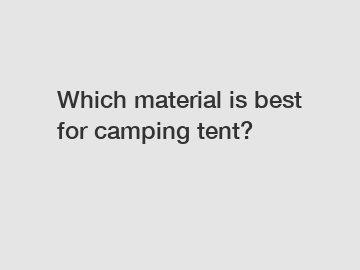Which material is best for camping tent?
Which Material is Best for a Camping Tent?
When it comes to choosing a camping tent, one of the key factors to consider is the material it is made from. With numerous options available, it can be overwhelming to decide which material is best suited for your camping adventures. However, by understanding the advantages and disadvantages of different tent materials, you can make an informed decision that enhances your camping experience. So, let's delve into the discussion around the best materials for a camping tent.
1. Nylon: Lightweight and Durable.

Nylon is a popular choice for camping tents due to its lightweight nature and excellent durability. This synthetic fabric is resistant to mildew, UV rays, and abrasions, making it well-suited for various weather conditions. Additionally, nylon is known for its water repellency, which ensures that you stay dry during unexpected rainfall. Its quick-drying properties further add to its appeal, allowing you to pack up your tent without the worry of moisture retention. However, nylon tents tend to shrink when wet, which can affect their overall longevity.
2. Polyester: Weather Resistant and Cost-Effective.
Polyester is another commonly used material in camping tents. Known for its durability and resistance to stretching, this synthetic fabric offers excellent longevity for regular campers. Polyester is also naturally resistant to UV rays, making it a suitable choice for prolonged sun exposure. Additionally, polyester tents do not shrink when wet, ensuring they maintain their shape and size even during rainfall. Despite these advantages, it is important to note that polyester is not as breathable as other materials, which may lead to condensation buildup in humid environments.
3. Canvas: Breathable and Insulating.
Canvas tents, made from a blend of cotton and polyester, have been a long-standing choice for camping enthusiasts. Known for their breathability, canvas tents provide excellent ventilation, making them ideal for warm climates. The natural fibers allow air to circulate freely, preventing condensation and maintaining a comfortable interior. Moreover, canvas is a strong and durable fabric that can withstand harsh weather conditions and heavy usage. However, these tents are heavier compared to their synthetic counterparts, making them less suitable for backpacking or long-distance hiking.
4. Ripstop: Enhanced Durability.
Ripstop fabric is gaining popularity among campers due to its exceptional strength and durability. This material is manufactured using a special weaving technique that reinforces the tent's fabric with interlocking reinforcement threads. Consequently, ripstop tents are resistant to tearing and punctures, providing enhanced longevity for rough camping trips. This makes them an excellent choice for adventurers who frequently camp in rugged terrains or face extreme weather conditions. However, it is worth noting that the added durability of ripstop tents often comes with a higher price tag.
In conclusion, the best material for a camping tent depends on individual needs and camping preferences. Nylon offers lightweight and water repellent properties, making it suitable for backpacking and various weather conditions. Polyester, on the other hand, is known for its cost-effectiveness and resistance to stretching, making it a reliable choice. Canvas tents prioritize breathability and insulation, making them ideal for warm climates. Lastly, ripstop tents, with their superior durability, are perfect for those seeking rugged adventures. Consider the advantages and disadvantages of each material, as well as your own requirements, to select the most suitable one for your camping experience. So, which material will you choose for your next camping tent?
Are you interested in learning more about conductive fabric suppliers, tent mesh material, what is net fabric made of? Contact us today to secure an expert consultation!


